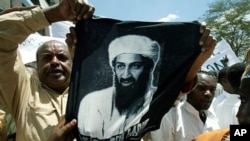While many Americans are celebrating the death of Osama bin Laden, others worry about his continuing role as an inspiration for terrorists and hate groups. Two experts, who study bin Laden’s role as a symbol, say the terrorist leader might be gone but is not forgotten.
Rabbi Abraham Cooper, associate dean of the Simon Wiesenthal Center in Los Angeles, directs a project that studies Internet hate groups. He says the center has seen increased chatter, or discussion, by militants in recent hours.
Related video report by Carolyn Pressutti
"First, disbelief -- some talk of a conspiracy. But by and large, expressions of grief and anger. And I am sure that in the coming hours and days, that chatter will then turn to revenge, what we do to get back at the enemy," said Cooper.
Other scholars are looking more closely at Osama bin Laden to understand the development of his ideas and to assess the extent of his influence. During the past decade, al-Qaida has released a series of well publicized audio tapes. But a California scholar is tracing the development of bin Laden's earlier thinking through audio tapes found in the terrorist leader's library in Kandahar, Afghanistan in 2001.
More than 1,500 tapes were acquired by CNN television and are now held by Yale University. Twenty-two recordings were of bin Laden, mostly public addresses in Saudi Arabia and other Muslim countries. Most of the other tapes are public addresses by other Muslim leaders or thinkers.
Religion scholar Flagg Miller at the University of California, Davis says the tapes reflect debates within bin Laden’s inner circle over the role of violence, especially against Muslims and non-combatants, as the terrorist leader crafted a militant message and tried to win followers.
The only tape published so far was recorded in 1996, and contains bin Laden’s declaration of war against the United States. Flagg Miller calls it an audacious attempt to mobilize the loosely-knit jihadist movement.
"He was kicked out of Saudi Arabia. He was exiled from Sudan under U.S. pressure. So in the late summer of 1996, he makes this statement declaring war against the United States. It’s an outlandish statement because he has no political party, he has no movement, he’s been stripped of his money," Miller said.
Miller says bin Laden was not a scholar, but that the al-Qaida leader artfully blended preaching and poetry, and tapped traditional Muslim themes as he urged war against the West.
"Once that message that the U.S. was the prime enemy became apparent and foregrounded in his speeches, he would lose broader audiences who felt like he was not paying enough attention to regional issues, including the Palestinians and so forth. But he would gain very hard-core militants who shared his vision," Miller said.
Miller says bin Laden’s early speeches show a patient recruitment effort as he urged followers to shift their attention from regional problems, such as bad government in the Muslim world, to what he described as a cosmic struggle. Miller says bin Laden underwent the same shift in his own thinking and rhetoric.
Al-Qaida now has a sophisticated Internet presence to promote bin Laden’s thinking. But Rabbi Abraham Cooper of the Simon Wiesenthal Center says other online sites are also dangerous. He notes that the radical Muslim cleric Anwar al-Awlaki uses high tech communications to urge acts of violence, and that al-Awlaki has been successful in recruiting so-called lone wolves.
"The Fort Hood shooter, Jihad Jane, the thwarted SUV New Year’s Eve attack in New York -- all of those had links to this man by way of email. So you have the use of the Internet to promote people to stay off the grid, make it more difficult for intelligence and law enforcement to even identify potential problems," Cooper said.
Cooper says law enforcement officials and political leaders need to assess the extent of the problem.
Flagg Miller warns that the importance of martyrdom for radical jihadists means that bin Laden will continue to have influence as a symbol despite his death. Still, he says, the loss of al-Qaida's charismatic leader is a major blow for the terror network.
Rabbi Cooper says the way that bin Laden met his demise in a face-to-face confrontation adds a measure of justice for his victims. But Cooper cautions that U.S. leaders need to assess the ongoing risk from others who are inspired by Osama bin Laden.
Experts Assess bin Laden’s Ongoing Influence




